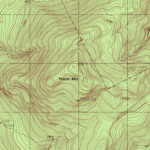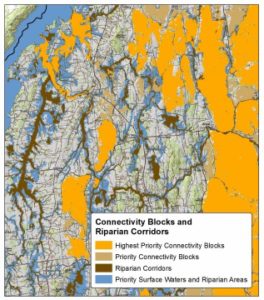The Jessie B. Cox Trust Regional Conservation Partnership Grant Initiative made its second round of grants to help strengthen regional conservation partnerships in New England.
The grants program supported capacity-building projects that increase collaborative conservation campaigns among regional organizations. It also supports transaction costs associated with the donation of conservation easements and fee simple lands of ecological significance.
2016 RCP Donated Land and Easement Fund Grants
Berkshire Wildlife Linkage Partnership
Western, MA
$20,000 to support the Berkshire Wildlife Linkage Partnership Due Diligence Fund. The fund will support conservation of key linkages in the a 2.4 million acre wildlife corridor that helps connect the Northern and Central Appalachian Mountains by linking the Green Mountains in Vermont to the Hudson Highlands in New York.
Mt. Agamenticus to the Sea Conservation Initiative
York, ME
$100,000 for a due-diligence/transaction fund that supports a larger campaign to protect 1,500 new acres in the six town focal area by 2018.
2016 RCP Innovation Fund Grants
Berkshire-Taconic Regional Conservation Partnership
The Berkshire-Taconic region is a huge landscape divided by jurisdictional boundaries of four states that severely limit conservation and coordination. Funding will support a multi-state conservation planning effort with 16 regional partners that will result in a map of priority areas and an action plan for the 3.8 million acre region.
Down East Research and Education Network
 DEREN has a large and diverse network of members, but hopes to involve a broader set of allies to develop and implement a bold conservation agenda for the Downeast region. Funding will support a member development initiative that supports the goals of broadening participation, increasing collaboration and strengthening organizational capacity to use shared tools and resources for conservation. The outreach effort will target town personnel, educators, business owners and additional government agencies currently underrepresented in the networks planning and conservation activities.
DEREN has a large and diverse network of members, but hopes to involve a broader set of allies to develop and implement a bold conservation agenda for the Downeast region. Funding will support a member development initiative that supports the goals of broadening participation, increasing collaboration and strengthening organizational capacity to use shared tools and resources for conservation. The outreach effort will target town personnel, educators, business owners and additional government agencies currently underrepresented in the networks planning and conservation activities.
High Peaks Initiative
 Most conservation maps focus on ecological priorities and often neglect areas of interest to the many outdoor recreation allies in the region. Funding will support the development of printed and electronic map-driven communication tools modeled on the Gazetteer maps. The tools would support conservation planning, landowner outreach, and involvement of outdoor recreation organizations in the High Peaks region of Maine.
Most conservation maps focus on ecological priorities and often neglect areas of interest to the many outdoor recreation allies in the region. Funding will support the development of printed and electronic map-driven communication tools modeled on the Gazetteer maps. The tools would support conservation planning, landowner outreach, and involvement of outdoor recreation organizations in the High Peaks region of Maine.
Staying Connected Initiative
 Staying Connected’s strategies and tools to involve the public and transportation officials in mitigating road barriers to wildlife migration and passage mitigation have been successfully implemented in many areas. Unfortunately, they have not been fully documented or disseminated throughout the region. A grant will help to develop strategies, educational materials, and tools to help transportation agencies incorporate wildlife connectivity needs into their planning and road maintenance work. The project will also build a stronger regional network of public and private partners to help institutionalize habitat connectivity in transportation agency planning and implementation.
Staying Connected’s strategies and tools to involve the public and transportation officials in mitigating road barriers to wildlife migration and passage mitigation have been successfully implemented in many areas. Unfortunately, they have not been fully documented or disseminated throughout the region. A grant will help to develop strategies, educational materials, and tools to help transportation agencies incorporate wildlife connectivity needs into their planning and road maintenance work. The project will also build a stronger regional network of public and private partners to help institutionalize habitat connectivity in transportation agency planning and implementation.
Staying Connected Initiative
 The Shutesville Hill Wildlife Corridor Project is the only viable ecological connection between the Green Mountains and the Worcester Range for over 20 miles of Vermont’s Route 100. Funding will support the development of a stronger partnership that can develop and implement a conservation plan for the region.
The Shutesville Hill Wildlife Corridor Project is the only viable ecological connection between the Green Mountains and the Worcester Range for over 20 miles of Vermont’s Route 100. Funding will support the development of a stronger partnership that can develop and implement a conservation plan for the region.